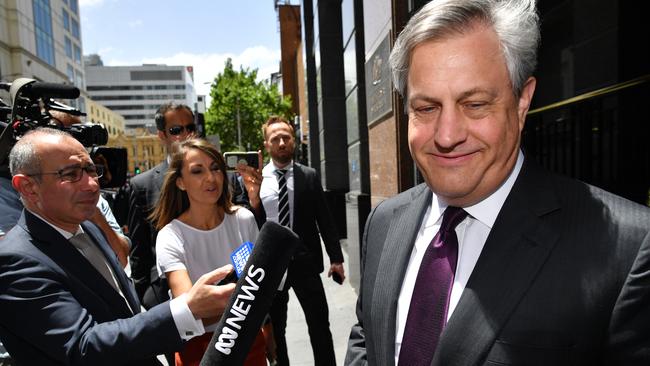Westpac’s Brian Hartzer admits banks underestimated wealth challenges
Westpac chief Brian Hartzer says big banks underestimated the challenges in pushing into wealth management.

Westpac chief executive Brian Hartzer says big banks underestimated the challenges in pushing into wealth management, as he called for the financial planning industry to lift its professional standards.
Rounding out his appearance on day four of the Hayne royal commission’s policy round, Mr Hartzer said the big banks had “clearly not” navigated their respective wealth forays well.
“I don’t think banks fully thought through how the model needed to evolve to be consistent with being part of a service business that focuses on long-term relationships,” he said.
“Banks just underestimated how different the models were, and how the model needed to evolve to be consistent with the way banks should run themselves.”
Westpac’s three big bank rivals are all at various stages of retreating from funds management, life insurance and financial planning.
Mr Hartzer, the outlier among his peers, has committed to Westpac’s BT wealth arm but earlier this month said Westpac was considering strategic options for its financial planning unit.
Documents were also tendered showing Mr Hartzer was initially somewhat reluctant to conduct a self-assessment demanded by the prudential regulator, because he didn’t believe the bank had the scale of issues that had entangled the rival Commonwealth Bank.
“My issue was that I was aware that the scale of the self-assessment that CBA had to do was extremely large and that it wasn’t obvious to me that we should be required to do the same level of exercise,” he said. In hindsight, Mr Hartzer noted the self-assessment conducted by Westpac “was a fantastic exercise” in further identifying weaknesses in systems or processes.
The Australian Prudential Regulation Authority released a scathing report on governance and compliance failings at CBA in May, after undertaking a deep dive into the bank’s processes, culture and systems. That followed a long list of scandals including a $700 million settlement for anti-money-laundering breaches, outdated life insurance medical definitions and charging fees for no service.
While its list may be shorter than that of CBA, Westpac has also been embroiled in scandals in its advice business, including charging customers fees for services they never received.
Commissioner Kenneth Hayne asked if there was a greater role for APRA to play in overseeing bank cultures and other parts of the industry, to which Mr Hartzer replied: “A bit more formality around the BEAR (banking executive accountability regime) has been broadly helpful … It’s important that it not devolve into a box-ticking exercise.”
Under at times heated questioning from senior counsel assisting Michael Hodge QC yesterday, Mr Hartzer reaffirmed his commitment to having an advice business in the future, even though the unit could change in shape or size.
“To walk away from it entirely to a certain extent is to abandon our customers. So we have to work through what’s the right approach,” he said.
Mr Hartzer admitted, though, that the planning industry had to become more professional.
“It should be. I think it’s moving in that direction. And I think more reform would be helpful,” he said.
The scale of disarray in Westpac’s systems was also clear. Mr Hartzer again conceded they were not up to scratch in the area of financial advice and record-keeping, meaning the bank was still assessing how much it would need to repay customers for charging them fees for no services.
“I would clarify and accept that at the moment it’s catching errors and fixing them and we have more work to do to make sure things are done right the first time,” he said.
Mr Hodge prodded Mr Hartzer on the quantum of the fee for no service issue, but did not get much further than in Wednesday’s questioning.
Of $991m in total advice fees earned over 11 years, including aligned advisers that sit under Westpac’s licence, Mr Hartzer said it was unclear how much would be paid out.
For Westpac-employed advisers, the bank has set aside $117m after assessing a fee pool of about $600m.
Mr Hartzer was strident in saying despite the scandal he did not think it was necessary to require customers to formally opt in to receive advice annually, instead of every two years. Asked whether he thought financial advice would ever be affordable for ordinary Australians, Mr Hartzer said: “Potentially if it is done through technology.”
By that he was referring to robo-advice, where consumers can enter details and automated systems can suggest investment options.
In his initial questioning, Mr Hartzer said “the economics” of owning a wealth management business were becoming increasingly challenging.



To join the conversation, please log in. Don't have an account? Register
Join the conversation, you are commenting as Logout